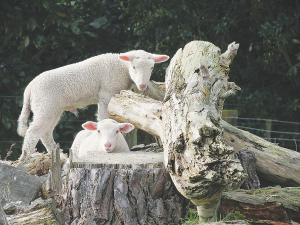Abomasal bloat in lambs leads to excess gas in the abomasum, which causes it to expand like a balloon. This can rupture the abomasum wall and crush surrounding organs causing death.
It is believed to be primarily caused by the bacteria Sarcina ventriculi. However, clostridial species such as Cl.sordellii and Cl.fallax can also cause bloat. Warm milk (lactose) entering the abomasum provides these bacteria with an ideal substrate for fermentation and to produce excess gas.
However, adding yoghurt to cows’ milk or milk replacer can put an end to the abomasal bloat that is all too common in artificially reared lambs.
This simple Norwegian technique, which uses acidophilus yoghurt (available in every supermarket), was adapted for use in New Zealand by Waikato farmer Claire Bull and veterinarian and farmer Jenny Burton.
It involves adding yoghurt to a mix of calf milk replacer and leaving the mixture warm for 8-12 hours.
The resulting yoghurttype mix is then added to the usual daily milk ration at a ratio of 1:7. This yoghurt mix will keep in sterile containers in a fridge for up to seven days and 200ml can be retained and used as a starter for the subsequent batch.
If there are only a small number of orphan lambs, one tablespoon of acidophilus yoghurt can be added and mixed well into 500ml of cow’s milk or reconstituted powder just before feeding.
Lambs affected by bloat can also be treated with 40-60ml of acidophilus yoghurt, administered through either a drench gun or stomach tube, three times a day.
Lambs should always have access to fresh, clean water.
It is the probiotics in the yoghurt that prevent the pathogens multiplying by competing with the bad bacteria. They also improve immune function and can reduce scouring. Prebiotics, also found in yoghurt, stimulate the growth of good bacteria.
Ideally, lambs should not be introduced to the warm yoghurt milk mix until they are five days old. On the first two days, the lamb should be fed warm ewe or cow colostrum (collected within 48 hours of the ewe or cow giving birth) and on days three to five, fed warm milk replacer. From day seven there can be a gradual transition from warm to cold feeding.
If abomasal bloat is a problem in artificially reared lambs, the wheybased milk powder could be considered as an alternative to whole milk. Whey-based powder doesn’t usually cause bloat and can aid rumen development if lambs are also given access to good quality pellets or hard feed.
Source: Beef+LambNZ



















